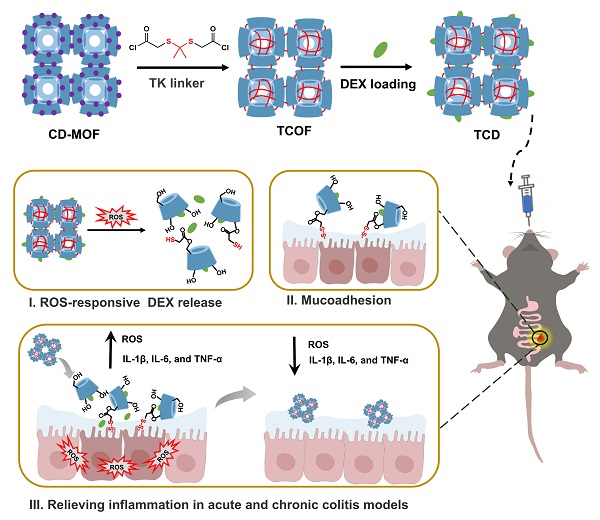ROS-responsive Cyclodextrin Supramolecular Nanoparticles for Precise Treatment of Colitis
Ulcerative colitis (UC) is a chronic and recurrent inflammatory disease impacting rectum and colon, with its prevalence surging in emerging industrialized nations and currently lacking a cure.
Overproduction of reactive oxygen species (ROS) in the inflamed intestinal mucosa of UC disrupts intestinal permeability and damages endothelial cells, worsening the condition. Long-term and frequent oral administrations of glucocorticoids often cause excessive systemic drug exposure and low bioavailability at the site of inflammation. Therefore, it is urgent to develop targeted antioxidant oral preparations for precise UC management.
In a study published in Advanced Functional Materials, research team led by Prof. ZHANG Jiwen from the Shanghai Institute of Materia Medica of the Chinese Academy of Sciences, in collaboration with Shenyang Pharmaceutical University and Beijing Sunny Medical Technology Co., Ltd., introduced novel ROS-responsive cyclodextrin supramolecular nanoparticles for tailored colitis therapy.
The researchers used biosafe cyclodextrin metal organic framework as reaction template and thioketal (TK) as cross-linker to construct a ROS-responsive crosslinked cyclodextrin organic framework (TCOF). Additionally, a carbon-carbon bonded crosslinked cyclodextrin organic framework (CCOF) served as ROS negative reference.
To confirm the precision medical benefits, researchers encapsulated the anti-inflammatory drug dexamethasone (DEX) within TCOF and CCOF, referred to as TCD and CCD, respectively.
In the in vitro experiments, the release profiles of DEX from TCD were promoted by H2O2 in medium. Through the synergistic effect of therapeutic DEX released at inflammatory site and ROS scavenging by TCOF, TCD effectively protected cells from oxidative stress damage and reduced inflammation levels.
In the in vivo experiment, after oral administration for 6 h, TCD levels in inflamed colon surpassed those in normal colons and CCD-treated inflamed colons. This increase was mainly due to oxidation and cleavage of TK groups in TCD by excessive ROS at the inflammatory site, exposing a mucosa-adhesive sulfhydryl group that enhanced drug and particle retentions in intestine. In acute and chronic colitis models of mice induced by sodium dextran sulfate, oral TCD significantly mitigated oxidative stress and ameliorated colitis symptoms in comparison to free DEX and CCD. In addition, TCD exhibited good safety in vivo.
In summary, TCD provided a novel approach for the precise treatment of inflammatory diseases.
DOI: 10.1002/adfm.202411979
Link: https://doi.org/10.1002/adfm.202411979

Oral inflammatory-targeted TCD relieved inflammatory symptoms in acute or chronic colitis (Image by ZHANG’s lab)
Contact:
JIANG Qingling
Shanghai Institute of Materia Medica, Chinese Academy of Sciences
E-mail: qljiang@stimes.cn




